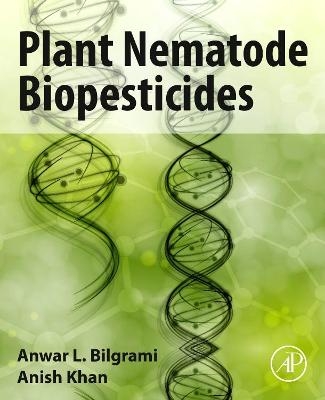
Plant Nematode Biopesticides
Academic Press Inc (Verlag)
978-0-12-823006-0 (ISBN)
In addition, the book addresses common reservations in using biopesticides, either alone or in integrated pest management programs, providing advanced insights on various biopesticidal agents and products. Biopesticides may be microbial (nematodes, bacteria, fungi, virus, herbs etc.), plant-incorporated protectants (PIPs), plant products (citronella oil, neem oil, capsaicin, pyrethrin etc.), synthetic biochemical molecules, pheromones, semio-chemicals, plant extracts, or nanobiopesticides.
Professor Anwar L. Bilgrami, an American Citizen is currently working as a Professor and Scientific Research Consultant in the Deanship of Scientific Research, King Abdulaziz University, Jeddah. Professor Bilgrami, specializing on behavior of nematodes and biological control of pests and parasites, has obtained PhD and DSc degrees in 1983 and 1995 respectively. He has, so far, published more than 130 original research papers in highly reputed journals, three books and contributed more than 20 chapters to the books edited by renowned subject experts. Professor Bilgrami has received several important academic awards, research grants and accolades from around the worlds. He has served various international journals as reviewer, co-editor and international adviser besides being the subject expert to review international research grant applications, career advancement credentials and academic programs of various universities. Professor Bilgrami has widely travelled across the globe for various academic and scientific engagements. He has been invited to more than 40 countries to collaborate research, as a visiting professor, speaker, coordinator, consultant etc. Professor Bilgrami is a member of several international scientific and academic bodies, including Fellow of the Japanese Society for Promotion of Science, Japan. Dr. Anish Khan is currently working as Assistant Professor in Chemistry Department, Centre of Excellence for Advanced Materials Research (CEAMR), Faculty of Science, King Abdulaziz University, Jeddah, Saudi Arabia. Completed Ph.D. from Aligarh Muslim University, India in 2010. Completed Postdoctoral from School of Chemical Sciences, University Sains Malaysia (USM) in Electroanalytical chemistry in 2010. Working in the field of synthetic biosensor, polymer composites, organic–inorganic electrically conducting nanocomposites. More than 200 research articles, 70 book chapters 30 books published in referred international publisher and more than 20 international conferences/ workshop. More than 30 research projects completed. Editorial board member of more than 11 international journals. Member of American Nano Society.
1. Introduction
2. Evolution and Biological Control
3. Attributes of Chemical Communications in Nematode Management
4. Host/Prey Specificity and Their Influences on Biopesticides
5. Attributes of Successful Biopesticides
6. Types of Nematode Biopesticides
7. Predaceous Nematodes
8. Microbial Biopesticides
9. Predaceous Soil Invertebrates
10. Predaceous and Parasitic Fungi
11. Antagonistic Plants and Plant Products
12. Biopesticidal Potentials of Neem (Azadirecta indica)
13. Plant and Animal Exudates
14. Biopesticidal Potential of Nanobiopesticides
15. Environmental Benefits and Risks
16. Conclusions: Prospects and Opportunities Bibliography
| Erscheinungsdatum | 30.05.2022 |
|---|---|
| Zusatzinfo | 75 illustrations (25 in full color); Illustrations |
| Verlagsort | San Diego |
| Sprache | englisch |
| Maße | 216 x 276 mm |
| Gewicht | 700 g |
| Themenwelt | Naturwissenschaften ► Biologie ► Ökologie / Naturschutz |
| Weitere Fachgebiete ► Land- / Forstwirtschaft / Fischerei | |
| ISBN-10 | 0-12-823006-1 / 0128230061 |
| ISBN-13 | 978-0-12-823006-0 / 9780128230060 |
| Zustand | Neuware |
| Haben Sie eine Frage zum Produkt? |
aus dem Bereich


